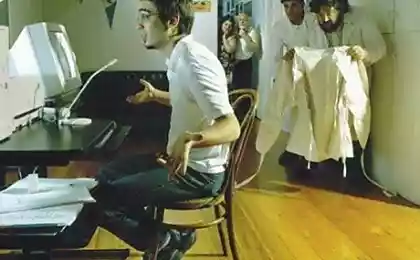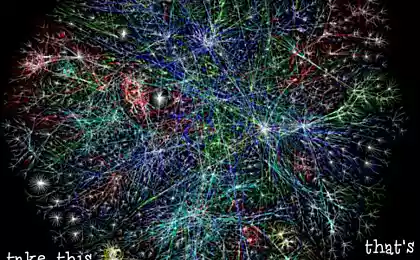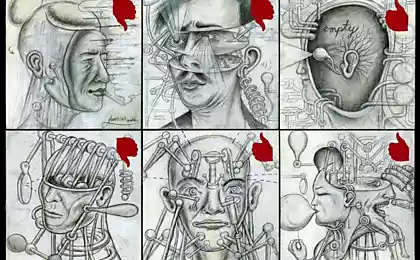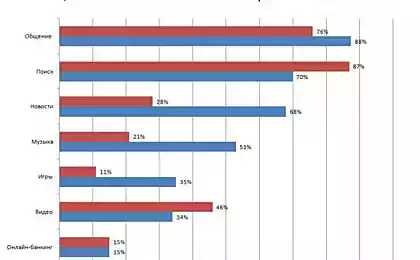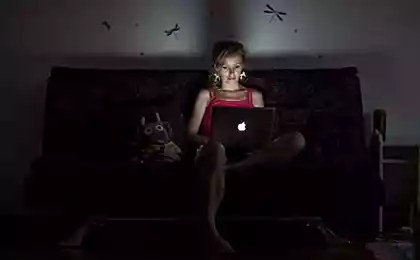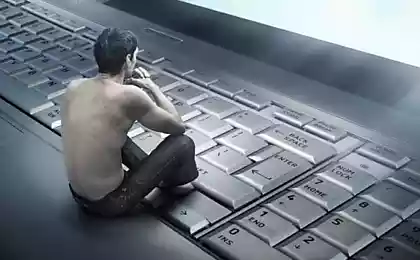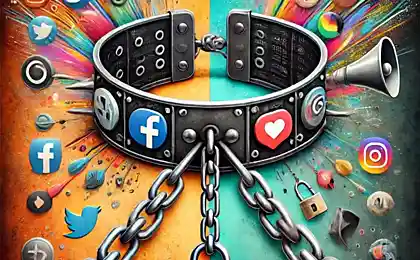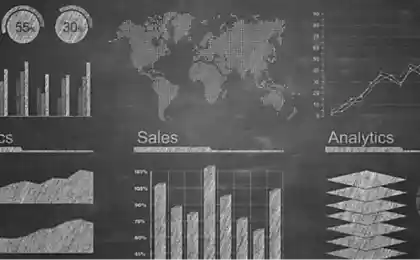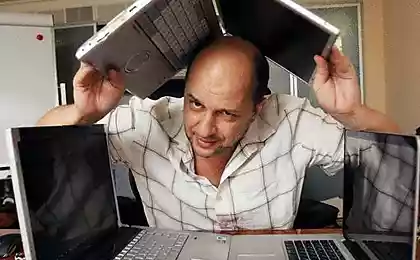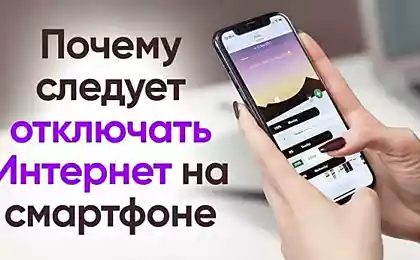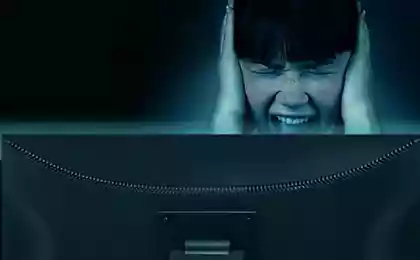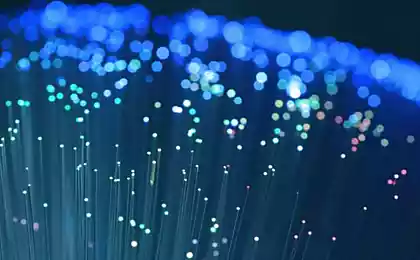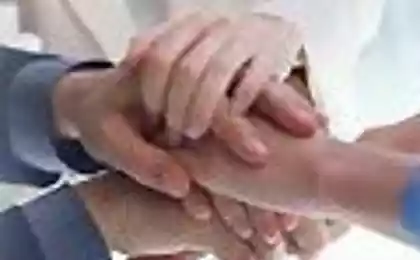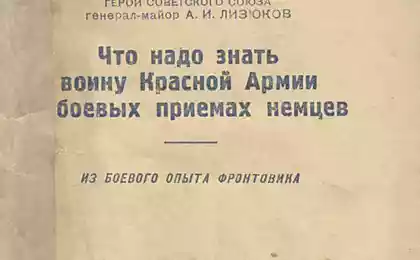497
Our children on the Internet
Thirty one million four hundred thirty one thousand three hundred seventy two
The problem of morality in our days is very critical, especially in connection with the unprecedented development of information technology and pervasive spread of mass media and communication.
Even adults, most of them already have formed a system of values, are not always able to navigate the flow of information. The more defenseless before aggressive exposure of the immoral, soulless, and sometimes just criminal information sources the younger generation, which by virtue of their age and instability of the psyche is much easier becomes the object of propaganda of anti-values.
In this context, is not funny seems to be a common joke, "what's the meaning of life? — I cannot say. Internet disconnected". On the Internet are almost not subject to the censorship (actually it is forbidden in our country is constitutional), and viable mechanisms that can deal with the proliferation of online immoral information to date, virtually no. The more that such is very often cleverly disguised as something completely opposite, for example, sites containing extremist appeals take the form of resources with a Patriotic agenda.
Research center "Kaspersky Lab" conducted a global investigation into the conduct of minors on the Internet. As it turned out, Russia is the second consecutive year ranked first in the number of requests the children to undesirable content. Under undesirable content refers to resources with pornographic content, sites that contain information about the weapon, and the online casino. The study showed that of all children, faced with the negative content sites, 16% live in Russia the biggest share on the country in second place is India, is located next to China.
Seventy six million two hundred sixty seven thousand six hundred eight
Rice. 1. The distribution of referrals of children to undesirable content by country [1].
In order to understand how the situation is depressing, it is necessary to note the following facts. First, the size and structure of population of Russia, China and India (leaders in the treatment of children to undesirable sites) varies greatly. In our country population is much lower, as the number of minors, as, for example, India is a young country and the proportion of children in the structure of its population is one of the largest in the world.
Thirty three million one hundred seventy five thousand nine hundred sixty seven
Rice. 2. The proportion of children under the age of 14 years, the structure of the population (data for the Russian Federation for 2010, according to China – for 2006, India for the year 2012).
Second, the analysis of the degree of Internet penetration by country shows that Russia is not is a leader in terms of Internet coverage of the population. At the end of 2013, only 62% of Russians have access to the Network. This is a relatively low figure, as in most Western countries, the Internet covers up to 80 percent or more of citizens.
Eighty five million one hundred seventy four thousand four hundred twenty six
Rice. 2. Internet penetration in the countries, % of the population [2].
Some attempts to protect children and adolescents from aggressive media, the government undertakes, in particular, in September 2012 entered into force the Federal law "On protection of children from information harmful to their health and development". Although the adoption of this law was a significant step in the formation of the system of protection of minors, experts say that a number of significant shortcomings – information spectrum, subject to limitation, is extremely narrow, the controlling entity is not defined, etc [3].
But in comparison with other countries Russia is definitely lagging behind in the field of monitoring over the content of Internet sites and the introduction of liability of ISPs for the audience of the content.
For example, in the UK, Germany, Canada and the Netherlands there is a legal requirement for providers to report sites that are suspicious or illegal information. In Sweden and New Zealand, Finland, Norway introduced a special system and a chip that allows you to filter unwanted content, and thus protect the children from the negative influence of the Internet. Russia is obviously inferior in this Western countries.
The social demand for work in this field exist – the majority of our citizens are already confident that a lot of Internet sites are far rather offensive. In the course of the sociological survey [4] revealed that 54% of Russians believe that Internet censorship is necessary due to the fact that it there are many dangerous sites and materials, and only one-third declares a reassessment of the dangers of the Internet and the inadmissibility of its redaction.
Sixty five million two hundred twenty seven thousand thirty five
Rice. 3. The Russians are about Internet censorship.
In the absence of the state system of moral censorship is almost impossible to protect minors from the negative influence of the Internet. It falls on the shoulders of parents who are charged with this obligation the Family code, which States that they "are obliged to care about health, physical, mental, spiritual and moral development of their children" [5]. That, of course, correct, but without the participation of the state in this issue attempt to implement these responsibilities is very much like fighting windmills. As it turned out, a little help, even technical means of protection used by parents, for example, "Parental control" — according to a study by McAfee in 2011, 70% of minors quite easily circumvent restrictions [6].
The problem of the development of the concept of law, which would ensure the rights and freedoms of citizens, including minors, to information positively affect their mental health and moral character, is actively rising. In the "State policy for the protection of morals and the media. Workbook legislator" [7] proposes an approach to protect people and society from the negative information, suggesting an active role of the state, the introduction of state regulation of circulation of media and control over the media and Internet.
Of course, we cannot talk about the Internet, only from the perspective of critical approach, it pretty much simplifies the process of learning broadens the mind and provides additional communication opportunities. But with all this he is a true weapon of mass destruction that can virtually to discreetly rastervect a generation.
Author: Hope Khvylya-Olinter
Source: ruslekar.info/Nashi-deti-v-Internete-3130.html
The problem of morality in our days is very critical, especially in connection with the unprecedented development of information technology and pervasive spread of mass media and communication.
Even adults, most of them already have formed a system of values, are not always able to navigate the flow of information. The more defenseless before aggressive exposure of the immoral, soulless, and sometimes just criminal information sources the younger generation, which by virtue of their age and instability of the psyche is much easier becomes the object of propaganda of anti-values.
In this context, is not funny seems to be a common joke, "what's the meaning of life? — I cannot say. Internet disconnected". On the Internet are almost not subject to the censorship (actually it is forbidden in our country is constitutional), and viable mechanisms that can deal with the proliferation of online immoral information to date, virtually no. The more that such is very often cleverly disguised as something completely opposite, for example, sites containing extremist appeals take the form of resources with a Patriotic agenda.
Research center "Kaspersky Lab" conducted a global investigation into the conduct of minors on the Internet. As it turned out, Russia is the second consecutive year ranked first in the number of requests the children to undesirable content. Under undesirable content refers to resources with pornographic content, sites that contain information about the weapon, and the online casino. The study showed that of all children, faced with the negative content sites, 16% live in Russia the biggest share on the country in second place is India, is located next to China.
Seventy six million two hundred sixty seven thousand six hundred eight
Rice. 1. The distribution of referrals of children to undesirable content by country [1].
In order to understand how the situation is depressing, it is necessary to note the following facts. First, the size and structure of population of Russia, China and India (leaders in the treatment of children to undesirable sites) varies greatly. In our country population is much lower, as the number of minors, as, for example, India is a young country and the proportion of children in the structure of its population is one of the largest in the world.
Thirty three million one hundred seventy five thousand nine hundred sixty seven
Rice. 2. The proportion of children under the age of 14 years, the structure of the population (data for the Russian Federation for 2010, according to China – for 2006, India for the year 2012).
Second, the analysis of the degree of Internet penetration by country shows that Russia is not is a leader in terms of Internet coverage of the population. At the end of 2013, only 62% of Russians have access to the Network. This is a relatively low figure, as in most Western countries, the Internet covers up to 80 percent or more of citizens.
Eighty five million one hundred seventy four thousand four hundred twenty six
Rice. 2. Internet penetration in the countries, % of the population [2].
Some attempts to protect children and adolescents from aggressive media, the government undertakes, in particular, in September 2012 entered into force the Federal law "On protection of children from information harmful to their health and development". Although the adoption of this law was a significant step in the formation of the system of protection of minors, experts say that a number of significant shortcomings – information spectrum, subject to limitation, is extremely narrow, the controlling entity is not defined, etc [3].
But in comparison with other countries Russia is definitely lagging behind in the field of monitoring over the content of Internet sites and the introduction of liability of ISPs for the audience of the content.
For example, in the UK, Germany, Canada and the Netherlands there is a legal requirement for providers to report sites that are suspicious or illegal information. In Sweden and New Zealand, Finland, Norway introduced a special system and a chip that allows you to filter unwanted content, and thus protect the children from the negative influence of the Internet. Russia is obviously inferior in this Western countries.
The social demand for work in this field exist – the majority of our citizens are already confident that a lot of Internet sites are far rather offensive. In the course of the sociological survey [4] revealed that 54% of Russians believe that Internet censorship is necessary due to the fact that it there are many dangerous sites and materials, and only one-third declares a reassessment of the dangers of the Internet and the inadmissibility of its redaction.
Sixty five million two hundred twenty seven thousand thirty five
Rice. 3. The Russians are about Internet censorship.
In the absence of the state system of moral censorship is almost impossible to protect minors from the negative influence of the Internet. It falls on the shoulders of parents who are charged with this obligation the Family code, which States that they "are obliged to care about health, physical, mental, spiritual and moral development of their children" [5]. That, of course, correct, but without the participation of the state in this issue attempt to implement these responsibilities is very much like fighting windmills. As it turned out, a little help, even technical means of protection used by parents, for example, "Parental control" — according to a study by McAfee in 2011, 70% of minors quite easily circumvent restrictions [6].
The problem of the development of the concept of law, which would ensure the rights and freedoms of citizens, including minors, to information positively affect their mental health and moral character, is actively rising. In the "State policy for the protection of morals and the media. Workbook legislator" [7] proposes an approach to protect people and society from the negative information, suggesting an active role of the state, the introduction of state regulation of circulation of media and control over the media and Internet.
Of course, we cannot talk about the Internet, only from the perspective of critical approach, it pretty much simplifies the process of learning broadens the mind and provides additional communication opportunities. But with all this he is a true weapon of mass destruction that can virtually to discreetly rastervect a generation.
Author: Hope Khvylya-Olinter
Source: ruslekar.info/Nashi-deti-v-Internete-3130.html
